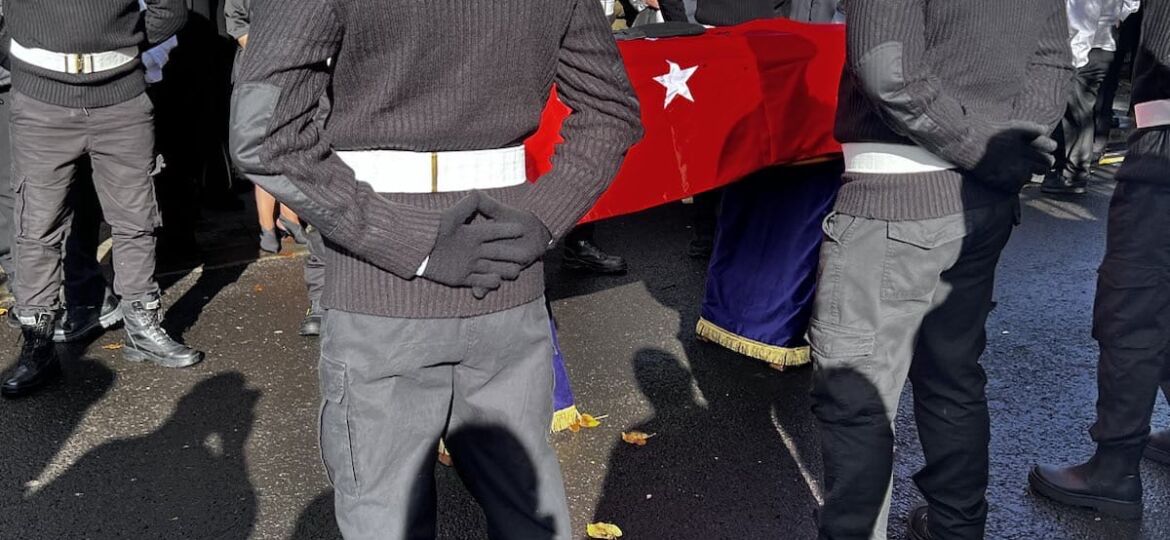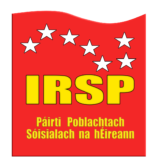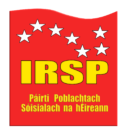
We gather here today to lay to rest our friend and comrade Terry Robson.
Let me begin by offering our solidarity, support and condolences to Terry’s family and friends. We stand with you at this difficult time.
Terry has had a remarkable political journey, never ever wavering from his core belief in Republican Socialism as the only answer to the economic and political enslavement of the Irish working class. He was small in stature but an intellectual giant who could articulate the needs and wants of the working class
Growing up in this city, that was gerrymandered and held back economically by the unionist corporation and government, he seen discrimination in terms of housing and employment and knew the working class needed to rise up against this as those in power would never simply let it go.
In the late 1960s Terry and Tommy and many other activists in Derry were awakening to the reality of the political situation and knew they had to act. All those radical youth gathered under the banner of the Young Socialists and began agitating for the human and civil rights.
Terry and the other activists quickly outgrew the vehicle of the Young Socialists. They decided collectively to join the IRA in 1968. Terry, along with Tommy McCourt, Johnny White, Mickey Montgomery and Seamus O’Kane all joined together. All were intelligent, articulate, radical and determined to bring about a working class revolution.
When the provisionals split from the IRA in 1969 Terry and his comrades all stayed with the republican movement and continued to fight the British occupation under the leadership of Johnny White, OC of the then Official IRA, who Terry greatly admired. What defined Terry and his comrades was their grasp of revolutionary politics married to republican armed resistance.
This same group of comrades, Terry, Tommy, Johnny, Micky and Seamus again stayed on the right side of history when they followed Seamus Costello out of the Officials. Terry never compromised on his revolutionary beliefs and was part of the entirety of the Derry Brigade of the IRA who moved over to the INLA in 1974.
Terry was in the Spa Hotel in Dublin in December 1974 when the Irish Republican Socialist Movement was born. There were two meetings that day. The first one in which the IRSP was formed and the secret second one in which the INLA was formed. Terry attended both. He was elected to the very first Ard Comhairle of the Irish Republican Socialist Party and was on the very first Army Council of the Irish National Liberation Army.
Not only did Terry take on these roles at national level, he returned back to Derry and immediately set about the task of organising the party and the army in this city to make them ready for the task ahead.
He was the very first OC of the Derry Brigade of the INLA, and under his leadership, which alternated with his close friend and comrade Tommy McCourt, the army excelled and was an effective military force within this city carrying our many operations against the British army and RUC resulting in many casualties among the enemy over the intervening years. Terry never faltered despite intense pressure from the British state, he was constantly harassed, raided and arrested for his role in the resistance. But he was never deterred.
In the late seventies Terry moved to Belfast with his then partner Pat. During his time there he became very close to figures such as Ronnie Bunting and stayed involved in the republican socialist struggle. The British government’s political assassination of Ronnie deeply affected Terry and reinforced a determination that only republican socialism can defeat the occupation of this part of Ireland.
As the political struggle moved forward our people became embroiled in the prison struggle within Long Kesh and the no wash protests of the late 1970s and then the hunger strikes of 1980 and 1981. Terry became a prominent member of the Armagh H-Block committees and as a friend and comrade of some of the prisoners he frequently visited Patsy O’Hara relaying information back and forward between the prisoners and their supporters and comrades on the outside, but just as importantly, giving Patsy friendship and a connection to the outside world.
There’s a famous photograph of Terry Robson on the platform chairing proceedings at Patsy’s funeral. Standing beside him is masked INLA volunteer Neil McMonagle. It’s an iconic image of that time and shows Terry’s connection to the prisoners and to the movement during that very difficult time.
Outside of the prison struggle Terry was leading the INLA in Derry against the British state and was consistently and centrally involved in military operations. This was during a time when the INLA were extremely active and successful. Some of the INLA’s most successful operations occurred under his leadership.
In the intervening years the British state focused in on those who were the biggest threats to their occupation of the north. One of their most discredited operations was the supergrass trials in which former comrades and other members of our community were coerced into giving false information against republican activists and repeating these accusations in Court. Our comrade Terry was falsely charged in three such supergrass cases and spent over a year on remand in the mid 1980s. False charges that would eventually be quashed.
Terry understood and advocated the primacy of politics and that all armed actions, indeed all activities of a revolutionary movement, should be done within the confines of the political struggle. That is the fundamental position of this revolutionary movement. To this end Terry sought to clearly define where republican socialist principles could be applied to every aspect of political decision making in Ireland. Terry was the chief author of the “Perspectives on the future of Republican Socialism in Ireland” and “Republican Socialist Programme for Ireland” that the IRSP released in October 2010. These were far reaching political documents that laid out in detail our position on a wide range of issues ranging from energy, transport, economy among others and what shone through was the intellectual giant that was our comrade Terry Robson.
Terry was our guiding light. He led the way. He articulated so eloquently what we need to do. He was a revolutionary fighter without compromise, fighting for the rights of his community from the barricades of the Bogside, he was a student who excelled academically graduating with two PHDs, he was a teacher, an author, a patriot, he was a loyal comrade to many and he was our leader during turbulent times.
Rest in peace comrade Terry Robson, we will never forget you.

